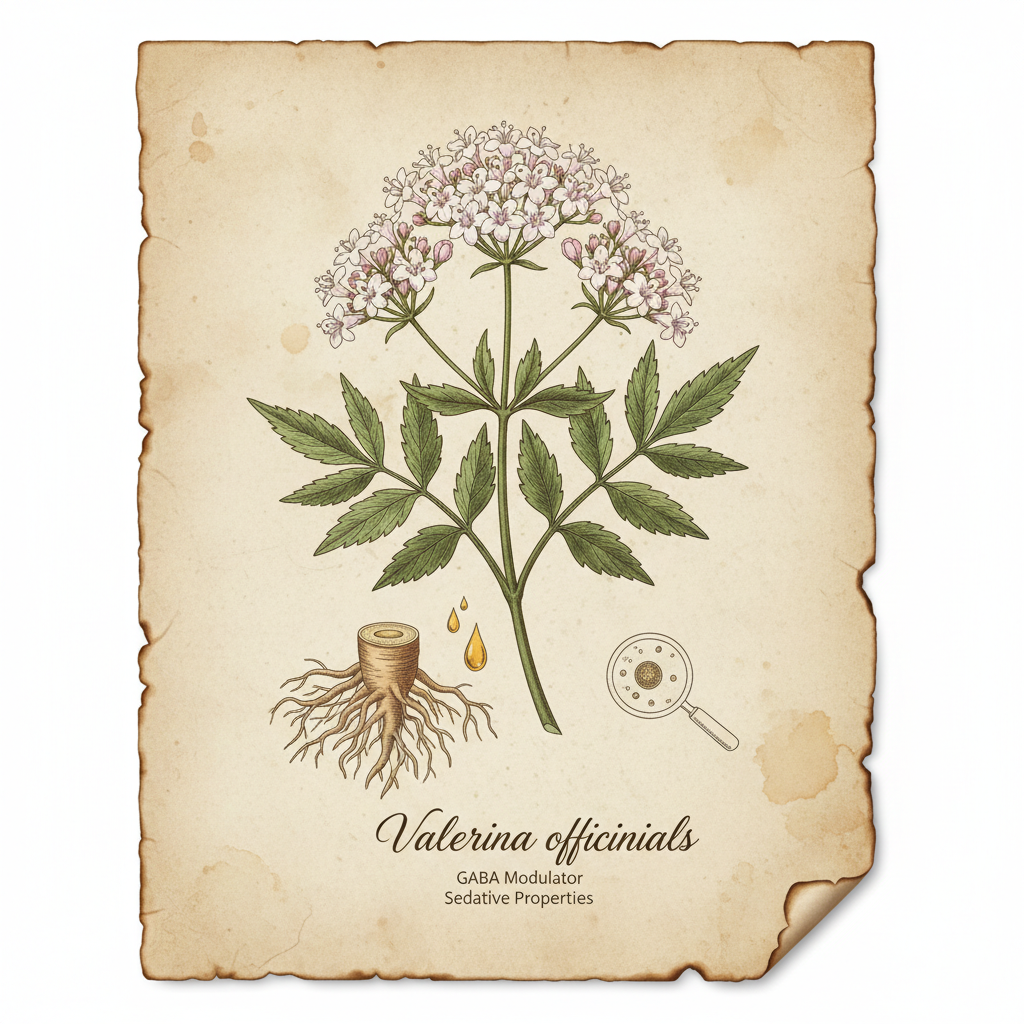- Pergunta respondida com sucesso
Valerian Root: The Science Behind the Sleep Aid and Its Side Effects
For centuries, the flowering plant Valerian (Valeriana officinalis) has been used as a traditional herbal remedy across Europe and Asia. It is primarily appreciated for its calming and sedative properties, with the dried root being the part most commonly used as a dietary supplement for issues like sleep and anxiety.
What is Valerian and How Does it Work?
Valerian root contains numerous chemical compounds, but its calming effects are generally attributed to its interaction with the central nervous system.
The primary proposed mechanism of action involves the neurotransmitter GABA (gamma-aminobutyric acid). GABA is the main inhibitory chemical messenger in the brain, responsible for decreasing nerve cell activity, which promotes relaxation and sleep.
- Enhancing GABA: Scientific studies suggest that compounds in valerian, such as valerenic acid, can increase the amount of GABA available in the brain, either by inhibiting its breakdown or by directly stimulating its release.
- GABA-A Receptor Modulation: Valerian components are also thought to interact with the GABAA receptors—the same receptors targeted by prescription anti-anxiety and sleep medications like benzodiazepines. By binding to these receptors, valerian mimics or enhances the calming effect of GABA, leading to sedation and reduced anxiety.
Scientific Evidence for Valerian’s Benefits
While valerian has been widely used, the scientific evidence on its effectiveness for some conditions can be inconsistent. However, several studies point to specific benefits:

1. Sleep Disorders (Insomnia)
This is the most well-studied use for valerian. Multiple studies suggest that valerian may:
- Reduce Sleep Latency: Help people fall asleep faster.
- Improve Subjective Sleep Quality: Lead to a feeling of better, more restful sleep, often with effects becoming more noticeable after taking the supplement consistently for two or more weeks.
- Note on Consistency: Some professional guidelines, like those from the American Academy of Sleep Medicine, do not recommend it for chronic insomnia due to the overall inconsistency in clinical trial results, though it appears effective for mild to moderate cases.
2. Anxiety and Stress
Valerian has traditionally been used to ease nervous tension.
- Anxiolytic Properties: Because of its GABA-modulating effects, valerian possesses properties that may help to reduce feelings of anxiety.
- Inconsistent Evidence: While some studies, particularly those involving patients with specific conditions like hemodialysis, show an improvement in anxiety, the overall scientific evidence to conclusively support its use for generalized anxiety is limited and requires more rigorous study.
3. Menopause Symptoms
- Limited Data: A few small studies suggest that valerian might be helpful for some symptoms associated with menopause, such as hot flashes and sleep disturbances, though the evidence is not yet conclusive enough for firm recommendations.
Potential Side Effects and Safety Concerns
Valerian is generally considered safe for short-term use (e.g., up to 4 to 6 weeks) in most healthy adults at standard dosages (often 300 to 600 mg). However, like any supplement, it can cause side effects and carries specific precautions.
Common Mild Side Effects
Side effects, when they occur, are usually mild and may include:
- Headache
- Dizziness or Drowsiness (especially the next day)
- Upset Stomach or mild gastrointestinal symptoms
- Mental Dullness or impaired concentration
- Vivid Dreams or nightmares
Safety Concerns and Warnings
- Interactions with CNS Depressants: Valerian can amplify the sedative effects of alcohol, benzodiazepines, opiates, antihistamines, and other central nervous system depressants. This combination can be dangerous.
- Avoid Driving/Operating Machinery: Due to its potential to cause drowsiness and mental dullness, caution is advised when driving or operating heavy machinery after taking valerian.
- Liver Function: Although rare, there have been case reports of liver injury when taking valerian, most often in combination with other herbs. People with existing liver disease should avoid valerian.
- Pregnancy and Breastfeeding: There is insufficient evidence to confirm safety during pregnancy or breastfeeding, so it should be avoided by this population.
- Long-Term Use and Withdrawal: The safety of long-term use (beyond 6 weeks) is unknown. Abruptly stopping valerian after prolonged, chronic use may lead to mild withdrawal symptoms, such as anxiety, irritability, and insomnia.
- Children: Valerian is considered possibly safe for children when used appropriately for short periods, but it is generally not recommended for children under the age of three.
Disclaimer: Always consult with a healthcare professional before starting any new supplement, including valerian, to ensure it is appropriate for your health condition and to check for potential interactions with any medications you are taking.
gerar imagem da planta



